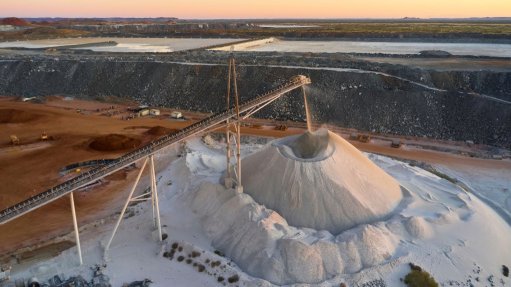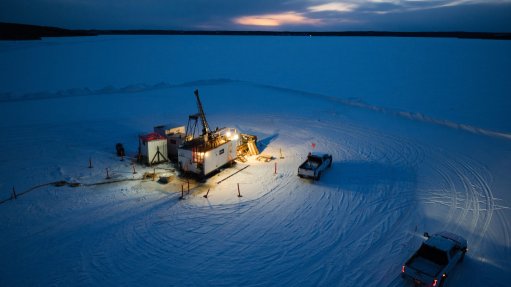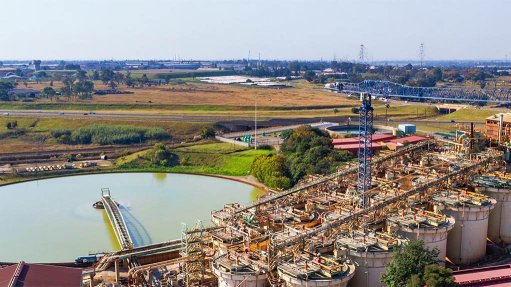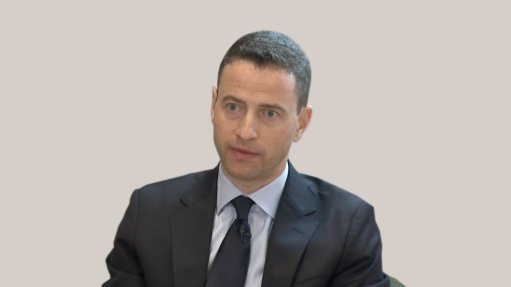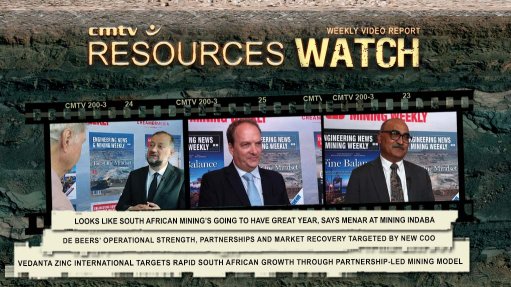Policy, admin have a long way to go before ‘open’ energy market can thrive

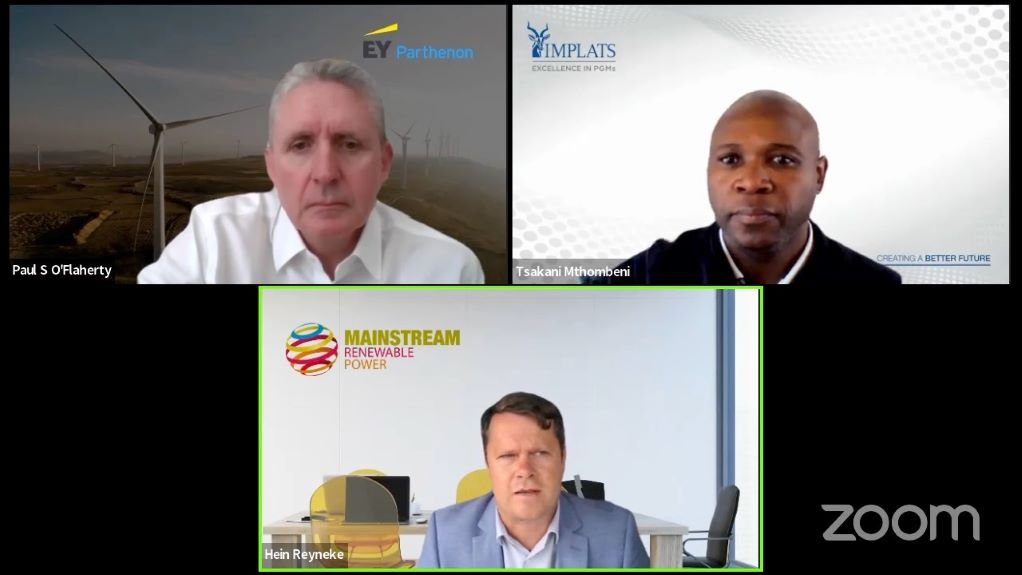
Creamer Media hosted a webinar on Advancing a Just Transition. Video and editing: Nicholas Boyd
While State-owned power utility Eskom is in the process of undergoing major structural changes and making strides to play its part in South Africa’s decarbonisation, some stakeholders believe there is more to be done before a just energy transition can be realised.
From a regulatory and policy perspective, Eskom CEO Andre de Ruyter deemed it prudent that government create policy alignment and complementarity between four major policy streams – energy, fiscal, industrial and environmental.
De Ruyter told Engineering News in an interview ahead of a webinar hosted by Creamer Media on February 2, that if South Africa had a more integrated policy approach, stakeholders would be better able to attract investors for projects. That would, in turn, encourage increased local manufacturing and create more jobs.
He said integrated policies would help to address energy security challenges, as well as pave the way for an open electricity market.
“With smart policies, we can also drive additional local content manufacturing, and have a targeted, strategic approach to it, instead of a brute force percentage requirement for project developers,” he explained, adding that government would do well to focus its efforts on giving certainty of demand for longer periods, as well as supporting supply chain development.
For example, De Ruyter highlighted how demand for electric vehicles was not growing at the pace that it could in South Africa, owing to high import duties, which impacted on investment. However, by allowing demand to grow and initially being satisfied by imports, it would, over time, result in a response from the manufacturing industry and drive higher local content.
Meanwhile, global consultancy EY-Parthenon executive director Paul O’Flaherty, who was the facilitator of Creamer Media’s webinar, titled ‘Advancing the Just Transition’, mentioned that South Africa had 18 000 MW of shovel-ready projects, just waiting for investment.
He asked the webinar participants – mining company Impala Platinum sustainable developments executive Tsakani Mthombeni and energy developer Mainstream Renewable Power Africa GM Hein Reyneke – what would attract more investment in the energy sector.
Mthombeni suggested a “one-stop-shop” entity that the mining industry, for one, could approach to conduct the necessary processes and administration to facilitate power projects, or officiate and effect wheeling agreements.
He pointed out that companies eager to build power projects or enter into wheeling agreements often had to visit multiple government offices as part of the process, which was onerous, confusing and costly.
In particular, he said, wheeling through the grid must be simplified.
Mthombeni also mentioned that the cost of energy storage technology and prevailing high electricity tariffs – and uncertainty about further increases – were also major factors for mining companies considering building renewable energy generation projects.
Electricity accounts for about 40% of a mining and processing operation’s input costs, and if the South African government delays addressing the issue, it could risk mining companies diverting their processing capabilities elsewhere, he noted.
Further, Mthombeni believed the unbundling of Eskom into three legal entities was a step in the right direction, as it would provide a more streamlined approach to administration and processes around transmission.
“Mining companies are willing and able to enter into power network partnerships, but it remains unclear whether it is possible and if the grid can come on board.”
He noted that about 5 GW of capacity could be added to the grid by mining companies alone.
Reyneke, in turn, mentioned the challenge the renewable industry had with local content and government’s changing requirements around it. Traditionally, it has been percentage-based.
For example, the local content requirement was 45% for solar projects and 40% for wind projects in Bid Window 5 of the Renewable Energy Independent Power Producer Procurement Programme; however, Reyneke explained government’s intention to now specify designated local content, meaning that certain items in the value chain need to be procured locally as part of the percentage threshold.
He said this left suppliers with too much power to ask exorbitant prices, and a question as to their ability to deliver the required volumes if a bigger scale of demand came through.
“The industry would prefer a percentage threshold for local procurement, and let the free market decide what can be localised in the best way. If we are to go through a designated local content process, it needs to be coordinated and properly structured with components that will create the most jobs for the lowest cost premium.”
De Ruyter had also called for a relook into procurement processes on multiple occasions, stating that there were often onerous requirements that added little value for public-private partnerships.
Particularly, he noted in an article published on Engineering News in November last year that South Africa’s public procurement rules undercut the utility’s effort to swiftly appoint the competent contractors needed to undertake Eskom’s crucial reliability maintenance recovery programme.
Should the utility wish to deviate from the rules, an application had to be made to the National Treasury, for which the average response time currently exceeded 77 days.
At worst, procurement issues contributed to delays with Eskom’s coal fleet maintenance programmes, and led to load-shedding, and, at best, constrained developers in their ability to realise the much-needed clean energy projects in the country.
Article Enquiry
Email Article
Save Article
Feedback
To advertise email advertising@creamermedia.co.za or click here
Press Office
Announcements
What's On
Subscribe to improve your user experience...
Option 1 (equivalent of R125 a month):
Receive a weekly copy of Creamer Media's Engineering News & Mining Weekly magazine
(print copy for those in South Africa and e-magazine for those outside of South Africa)
Receive daily email newsletters
Access to full search results
Access archive of magazine back copies
Access to Projects in Progress
Access to ONE Research Report of your choice in PDF format
Option 2 (equivalent of R375 a month):
All benefits from Option 1
PLUS
Access to Creamer Media's Research Channel Africa for ALL Research Reports, in PDF format, on various industrial and mining sectors
including Electricity; Water; Energy Transition; Hydrogen; Roads, Rail and Ports; Coal; Gold; Platinum; Battery Metals; etc.
Already a subscriber?
Forgotten your password?
Receive weekly copy of Creamer Media's Engineering News & Mining Weekly magazine (print copy for those in South Africa and e-magazine for those outside of South Africa)
➕
Recieve daily email newsletters
➕
Access to full search results
➕
Access archive of magazine back copies
➕
Access to Projects in Progress
➕
Access to ONE Research Report of your choice in PDF format
RESEARCH CHANNEL AFRICA
R4500 (equivalent of R375 a month)
SUBSCRIBEAll benefits from Option 1
➕
Access to Creamer Media's Research Channel Africa for ALL Research Reports on various industrial and mining sectors, in PDF format, including on:
Electricity
➕
Water
➕
Energy Transition
➕
Hydrogen
➕
Roads, Rail and Ports
➕
Coal
➕
Gold
➕
Platinum
➕
Battery Metals
➕
etc.
Receive all benefits from Option 1 or Option 2 delivered to numerous people at your company
➕
Multiple User names and Passwords for simultaneous log-ins
➕
Intranet integration access to all in your organisation












